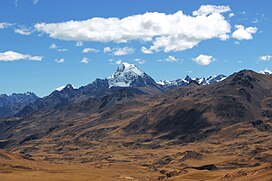Pariauccro[1][2] or Pariaucro[3] (possibly from Quechua parya reddish, copper or sparrow, ukru hole, pit, hollow)[4][5][6][7] is a massif in the Huayhuash mountain range in the Andes of Peru. This mountain has two summits (Pariauccro Grande and Pariauccro Chico), the highest one reaching an altitude of 5,572 m (18,281 ft).[1][2] It is located in the Lima Region, Cajatambo Province, Cajatambo District.[8] Pariauccro lies on a sub-range west of the main range, north of Mitopunta and northeast of Huacshash.[1][2]
| Pariauccro | |
|---|---|
 Huacshash (center) with the peaks of Pariauccro massif in the background (on the right) | |
| Highest point | |
| Elevation | 5,572 m (18,281 ft) |
| Coordinates | 10°24′21″S 76°56′00″W / 10.40583°S 76.93333°W |
| Geography | |
| Location | Peru, Lima Region, Cajatambo Province |
| Parent range | Andes, Huayhuash |
References
edit- ^ a b c Alpenvereinskarte 0/3c. Cordillera Huayhuash (Peru). 1:50 000. Oesterreichischer Alpenverein. 2008. ISBN 9783937530079.
- ^ a b c Peru 1:100 000, Yanahuanca (21-j). IGN (Instituto Geográfico Nacional - Perú).
- ^ Díaz, Felipe (2008–2009). Carta Turística. Cordilleras Blanca, Negra, Huayhuash y Callejón de Huaylas.
- ^ César W. Astuhuamán Gonzáles, Pariacaca: un oráculo imperial andino: "Respecto al significado del nombre de la deidad, los términos Paria (rojiza) y caca (montaña), aluden a una montaña rojiza, ... ."
- ^ Rodolfo Cerrón-Palomino, Pontificia Universidad Católica del Perú, Sufijos arcaicos quechuas en la toponimia andina, Etimologias, Lexis XXVI. 2 (2002): 559-577
- ^ Teofilo Laime Ajacopa (2007). Diccionario Bilingüe: Iskay simipi yuyayk’anch: Quechua – Castellano / Castellano – Quechua (PDF). La Paz, Bolivia: futatraw.ourproject.org.
- ^ Ana Arias Torre, Toponimia de Ticapampa, in: Letras, Departamento Académico de Humanidades, Universidad Nacional Mayor de San Marcos, Facultad de Letras, Facultad de Letras y Ciencias Humanas, p. 191
- ^ escale.minedu.gob.pe - UGEL map of the Cajatambo Province (Lima Region)
